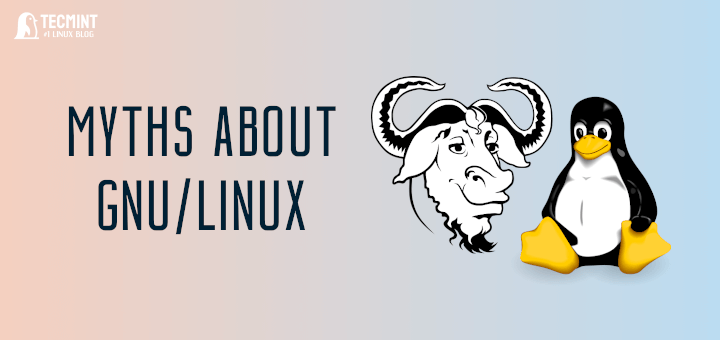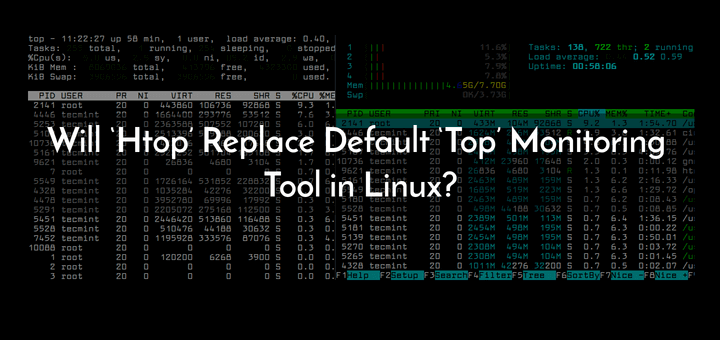A server is a computer software or a machine that offers services to other programs or devices, referred to as “clients“. There are different types of servers: web servers, database servers, application servers, cloud computing servers, file servers, mail servers, DNS servers and much more.
The usage share for Unix-like operating systems has over the years greatly improved, predominantly on servers, with Linux distributions at the forefront. Today a bigger percentage of servers on the Internet and data centers around the world are running a Linux-based operating system.
Read Also: 5 Reasons to Install Linux Today
Just to make you further understand the power of Linux in driving the Internet, companies such as Google, Facebook, Twitter, Amazon and many others, all have their servers running on Linux-based server software. Even the world’s most powerful supercomputer runs on a Linux-based operating system.
There are a number of factors that have contributed to this. Below, we have explained some of the major reasons why Linux server software is better than Windows or other platforms, for running server computers.
1. Free and Open Source
Linux or GNU/Linux (if you like) is free and open source; you can see the source code used to create Linux (kernel). You can check the code to locate bugs, explore security vulnerabilities, or simply study what that code is doing on your machine(s).
Additionally, you may easily develop and install your own programs into a Linux operating system because of numerous available programming interfaces you need. With all the above features, you can tailor a Linux operating system at its most basic levels, to suit your server needs unlike Windows.
2. Stability and Reliability
Linux is Unix-based and Unix was originally designed to provide an environment that’s powerful, stable and reliable yet easy to use. Linux systems are widely known for their stability and reliability, many Linux servers on the Internet have been running for years without failure or even being restarted.
The question is what actually makes Linux systems stable. There are many determinants which include management of system and programs’ configurations, process management, security implementation among others.
In Linux, you can modify a system or program configuration file and effect the changes without necessarily rebooting the server, which is not the case with Windows. It also offers efficient and reliable mechanisms of process management. In case a process is behaving abnormally, you can send it an appropriate signal using commands such as kill, pkill and killall, thus dealing away with any implications on the overall system performance.
Linux is also secure, it highly restricts influence from external sources (users, programs or systems) that can possibly destabilize a server, as explained further in the next point.
3. Security
Linux is without doubt the most secure kernel out there, making Linux based operating systems secure and suitable for servers. To be useful, a server needs to be able to accept requests for services from remote clients, and a server is always vulnerable by permitting some access to its ports.
However, Linux implements a variety of security mechanisms to secure files and services from attacks and abuses. You can secure services using programs such as a firewall (for example iptables), TCP wrappers (to allow and deny service access), and Security Enhanced Linux (SELinux) which helps to limit the resources a service can access on a server.
Read Also: 5 Reasons Why I Hate Gnu/Linux
SELinux ensures for instance that a HTTP server, FTP server, Samba server, or DNS server can access only a restricted set of files on the system as defined by file contexts and allow only a restricted set of features as defined by Booleans.
A number of Linux distributions such as Fedora, RHEL/CentOS, and a few others ship in with SELinux feature included and enabled by default. However, you can disable SELinux temporarily or permanently, if need be.
All in all, in Linux, before any system user/group or program accesses a resource or executes a file/program it must have the appropriate permissions, otherwise any unauthorized action is always blocked.
4. Flexibility
Linux is so powerful and flexible. You can tune it to meet you server needs: it allows you to do whatever you want (if possible). You can install a GUI (graphical user interface) or simply operate your operate your server via a terminal only.
It offers thousands of utilities/tools which you can choose from to do such things as perform system start up and manage services, add users, manage networking and disks, install software, monitor performance and generally secure and manage your server. It also enables you to choose either to install binary files or build programs from source code.
One of the most powerful standard programs present in Linux is the shell, is a program that provides you with a consistent environment for running other programs in Linux; it helps you interact with the kernel itself.
Importantly, the Linux shell provides practical programming constructs that let you make decisions, execute commands repeatedly, create new functions/utilities/tools, and automated daily server administration tasks.
Basically, Linux gives you absolute control over a machine, helping you to build and customize a server just the way you want (where possible).
5. Hardware Support
Linux has a rock-solid support for a mix of computer architectures, on both modern and moderately old hardware. This is one of the most significant factors that make Linux better than Windows for servers, that is if you have a small budget for hardware acquisition.
Linux remarkably supports relatively old hardware, for example the Slackware Linux site is hosted on Pentium III, 600 MHz, with 512 megabytes of RAM. You can find the list of supported hardware and related requirements for a specific distribution from their official websites.
6. Total Cost of Ownership (TCO) and Maintenance
Finally, the total cost of owning and maintaining a Linux server is lower compared to a Windows server, in terms of licensing fees, software/hardware purchase and maintenance costs, system support services and administrative costs.
Unless you are running a proprietary Linux distribution such as RHEL or SUSE server Linux which require subscription, for you to receive premium support and services, you will encounter affordable costs while running a Linux server.
Studies by Robert Frances Group (RFG) and similar companies, have in the recent past found Linux to be less expensive in a typical server environment comparable to Windows or Solaris, notably for web deployments.
Read Also: 10 Best Linux Server Distributions of 2017
In Conclusion
Linux has today become a strategic, efficient and reliable platform for business systems at many small, medium to big companies. A larger percentage of servers powering the Internet run on a Linux-based operating system, and this has been attributed to the above key reasons.
Are you using Linux on your servers? If yes, tell us why you think Linux beats Windows or other platforms for servers, via the comment form below.








I want to install anydesk on SUSE Linux server 12.
Please give me the steps for this.
All of that points are defining why WINDOWS is better for server. Except for first point but in real life- nobody who makes money give a shit about if software is open source or not.
I’ll use Linux ONLY because it’s popular as server solution in smaller companies. I hope that I will be able to switch to working in Windows ASAP. In that system things just work. Work how they should, how you expect them to and you are not scared with every update that something will go wrong.
@Dawid
Many thanks for the feedback.
I think you need to update yourself on the state of affairs.
If what you say is true, then why are two thirds of world’s servers run on Linux? Google and Facebook, as well as many European city governments, are running Linux on their servers.
Who said servers? Number 7: Virtual Machines. VPS really popular today. Hypervisors totally free. You can use Xen, KVM and ESXI. But without a Windows Server paid license isn’t real to work with Hyper-V.
The question is can your virtual machines be less virtual? The answer is clearly
yesand this is the main available thing who Hyper-V missed: PCI pass-through. Please don’t think I hate Windows, I like it in some cases. Desktop is a place where Redmond is the number one. However, speaking of another areas, phone market is GNU/Linux, supercomputers is GNU/Linux, your car, TV, a router, pretty much everything is GNU/Linux.Google, Facebook or Twitter is GNU/Linux, too. Intel a Microsoft friend by troubles (who slow down and broken Moore’s law) now faces Spectre and Meltdown. AMD speed up and we have Ryzen and Threadripper. ARM? Well I think you have a chance to see it.
Why not? Mixed Reality need power and Intel lost mobile market for a reason. ARM amazingly good using your power. Servers using GNU/Linux mainly because is cheaper, has greater stability and OpenSource provide them better security and flexibility. x86/x64 is an interesting beast.
AMD and Intel have some tech and accidentally one using what another using. X86 is Intel and X64 is AMD. However, they kick out any who trying to go into their market very badly. This is why ARM exist and why is so different. Not Intel nor AMD allow using their instructions. They remind me Windows somehow. The whole reason why ARM is so unpopular is not only less aware of but Virtualization as is.
Only ARMv7 in 2011 add it, 5 years later than competitors. Another reason is uncomfortability with X86 applications, I think. Plus the server market is very slow to changing, even new AMD CPU who have good price isn’t so widely popular like Intel Xeon ones…
Okay, speaking of VMs, I see for example nVidia clearly wanted to eat your wallet and take all your money via useless Quadro series. I don’t like it, and if I have a server, I most likely buy more RAM than waste my money for no reason, this Quadro so overpriced! Why? “GeForce is just fine,” you think and wanted set up the beast but you have no luck to work with it because famous “Error 43” caused by a driver. The developer team of nVidia detected a hypervisor environment and write a program code to block you from any kind of pass through.
Sadly this is a proprietary driver and you have no money for AMD who don’t create that problem for you, AMD new drivers is great and OpenSource, not like nVidia who every time create problems both for VMs and GNU/Linux’s Kernel. Microsoft? No luck with Hyper-V, sorry, that isn’t real here. All this things starting as 1 to 6 just way us to a Great Result of success even with that worsiest case. GNU/Linux community so helpful in solving problems created by wastemoneyful corporations. The people wrote a trick who made think the driver like a machine isn’t virtual and the error “magically” gone.
I have 64 GB of RAM and 24 cores so if no VMs, that is a kind of strange to don’t have. This is an ex-server machine and I can even make fully functional systems with it. I mean if you don’t know what it realty is, you can’t say something like “Looks like VirtualBox box here”. Perhaps I know not VirtualBox nor VMware provide any kind of acceptable 3D for.
Sorry but IMO they both—no matter Oracle VirtualBox or VMware Workstation—sucks even a 10 year old cheap crappy VGA because virtualization is not emulation, forget about them if you a gamer. Also Oracle using Wine so if you on GNU/Linux is making no sense why just using Wine natively in the first place if you need. In fact the problem is an emulated videocard is a nightmare, a Wine style emulated videocard is double trouble. Only IOMMU (VT-d/AMD-Vi) is a way for you, however, not every motherboard capable for that and I recommend using UEFI, too. Don’t even try Windows 7, the UEFI support sucks, the default videodriver need CSM but OpenSource UEFI firmware not capable to provide it.
I have successfully passthrough my two VGA to two virtual Windows so 3D does work (only 1-2% of performance lost) and a separate GNU/Linux server with AppArmor (an alternative to NSA’s SElinux) for things like streaming and some internal services via NGINX, PHP, Samba, OpenSSH, DNSCrypt, DLNA, Tor, Shadowsocks, OpenVPN, Nextcloud, P2P, Syncthing, etc. Good luck with Windows! I can guarantee no one can did the same with Hyper-V and nVidia. And this is a proof of the Linux Power. With GNU/Linux you owm a system and can do what you want, with Microsoft Windows a system own you and you just a customer who can nothing more than pay money.
Do you see the difference? That why Windows fails. That why servers, supercomputers and your phone isn’t Windows. You can’t find a thing where they wins because even if speaking of consoles you have Sony who is the Winner. Cortana fails, too. Google and Amazon wining. Microsoft is a little huge desktop only company who is like IBM for now. Nothing new, nothing surprising, a frozen state. So sad… In some cases is very risky for customers because imagine Intel without AMD. What? For more than 5 years Intel did nothing before AMD made Ryzen, now you have prices down and more cores than ever for non-server users. That’s it. Sony need a powerful Microsoft to be better, we need it, but a hope is nothing, Microsoft continuing to fail infinitely. Eh… So sad again.
P. S. Dear Aaron Kili. You have the rights to edit, add or rewrite my message. I even allow shorter it. Sorry if something wrong but English isn’t my native language. I like your article and think it great. My name, email and IP is an illusion, I like more anonymity so don’t rely on them in your decisions. Bye!
@RedMadDustention
Many thanks for sharing your thoughts with us.
I installed Linux on a flash drive with ext4 and disabled the journal. I then installed zram and made some tweaks to reduce disk writes. My default download directory is a tmp ramdrive with limited rights. After installing the programs I needed I ran prelink, installed preload, and the result is I can unplug the Sandisk Cruzer Fit and plug it in on my work PC or my laptop and no hardware complaints. It just works.
I have a script to launch an https server if I want to share files. My default document viewer, multimedia viewer, image viewer, etc open in a firejail. Iptables is pretty well locked down and I view the logs when necessary. I can backup and boot from DVD or USB and have everything I need.
Try that with Windows.
@MikeOh
This clearly explains some of the amazing things one can do with Linux, which shades more light on the above points. Many thanks for adding your thoughts and experience to the debate.
I am doing windows and Linux admin server support and the times I need to address windows servers is far more often then Linux. There are consistent patches and fixes that you have to address with windows and don’t forget the stuff they break. As of security if you don’t know that Linux is better you never supported windows and Linux. Most Linux server don’t need an external firewall like all windows server I have dealt with.
@Jasen
Thanks for giving a bit of your experience with the two operating systems, especially concerning some of the points mentioned above.
These are all valid reasons until you start working in a mixed prod environment and realise that you’ve been living a lie.
OpenSource isn’t always seen as a benefit since anyone can read the code and write an exploit, this is harder to achieve when you don’t have the code (proprietary).
Stability, security and hardware support are all debatable and really depend on your project.
@Tomas
This is a well-thought-out concern. First, its true that any one having access to the code can analyze vulnerabilities and write exploits for them. The power of open source comes in giving a user power of the system, to build from the ground up. This implies that a skilled and technically inclined user can easily enhance system stability and deal with potential security issues.
And as you have said, i need to test a mixed production environment to draw a more valid conclusion. However, Linux has been at the forefront in exposing the benefits of free and open source software(FOSS), which the world is getting to understand. Thanks for sharing your thoughts with us.
I’m not arguing the benefit that OpenSource provides, surely you can build from the ground up (e.g. Gentoo) your whole home lab (been there, done that). But this will not happen when your run production servers. You will need something that comes with SLA and support. You have to draw a line between your home lab and production.
The fact that Linux is OpenSource is a two-edged sword really. There were over 400 Linux kernel security vulnerabilities published in 2017, with Blueborne topping the chars I believe. How many have been published for a Windows kernel?
We all remember OpenSSL HeartBleed, don’t we? Although not directly related to Linux but rather OpenSource, the vulnerability was present for over two years. TWO YEARS. It’s false sense of security to say that OpenSource (hence Linux) is more secure because the source is open and everyone can read it unless someone actually does read it. How many people do read it? A handful.
@Tomas
There are several Linux distros that come with remarkable premium support, such as Red Hat Enterprise Linux, SUSE Linux and so much more.
Secondly, Linux being OpenSource is a “two-edged sword” is true. However, even if over 400 Linux kernel security vulnerabilities were published in 2017, according to the latest usage statistics and market share of server operating systems, nearly 70% of websites out there are running on servers powered by Unix operating systems with Linux distros taking a bigger percentage.
This alone should help us understand the fact that a lot of companies/businesses or individuals out there find Linux more reliable and stable or even more secure than Windows, especially in production environments or data centers.
I was challenging your statement about “building Linux from the ground up” saying that such deployment will come without SLA and support. Your response to this is that “some Linux distros come with remarkable premium support”. I am well aware of that as I use RHEL in prod, but this is not the point. You are mixing different things.
You can buy RHEL support, but try compiling your own kernel afterwards and you’re on your own. When you buy RHEL premium support you have to deploy things in a RHEL way (they tell you what is is supported and what isn’t), meaning that your options for “building from the ground up” become extremely limited. I hope this clarifies it to you.
About those 70% of websites running on *nix OS which you mentioned, you are simply assuming that companies “find Linux more reliable and stable” and even go further to call it a fact. Although I agree that your assumptions may be correct, the quantity does not automatically imply reliability, stability nor security. I could say that companies find *nix cheaper to run.
I use Linux server software for a long time. My network is not that big but it is useful for game stream or kodi stream, file sharing and Web sharing. In short, Linux is everything you need to run stable and flexible.
@Yirnick
Thanks for sharing your thoughts with us.
After a long time building and supporting Windows systems. I bought an old PowerMac to learn and explore Linux. After my wife became ill I built a mediaserver and now run an old HP Workstation which now runs Ubuntu Server, Plex, Docker and ZFS.
The reduction is the amount of maintenance a Linux server requires compared to Windows is astounding. And when I have experienced downtime it’s usually because I did something stupid. I now don’t have a single Windows machine in the house and it’s the best decision I’ve ever made.
If your unsure about it buy a pi3 and play with it. There’s lots of help available online. You will try things and they may not work but stick at it, you’ll get there. I found omgubuntu and webupd8 sites helpful.
@Stephen
Many thanks for sharing your experience with us. And by the way Tecmint.com is Linux oriented and you will find it even more useful because we comprehensively cover two of the most popular parent Linux distributions: Debian and Red Hat Enterprise Linux(RHEL) as well as their well known derivatives Ubuntu and CentOS/Fedora respectively. We are trying our best to bring in other distros as well.
Its the same garbage reasons from 20 years ago. Windows Server 2016 is worth the money, and is much better than Linux and I have used both of them.
@Tim
May be mentioning to us factors that you think make Windows Server 2016 better than Linux server software, would make things more clear. And thanks for the feedback.
The only thing that’s true here is the total cost of ownership. It’s as if the author’s knowledge is based on things clueless OS fan boys say.
Coming from a Linux drivers developer.
@Matt
The other reasons also apply, Linux is known to be more stable and secure than Windows. The flexibility of Linux is remarkable and can’t be matched by Windows. And above all, it’s free and open source meaning you can setup a custom server from the ground up.
Thanks for the feedback.
@Matt, @Tim — Not to denegrate your input but can you provide concrete examples of your points so as to enlighten the readership here? Without such, such responses just come as nefarious and unfounded denegrations. Not saying you’re wrong (or correct) just that blah blah statements do no-one any justice.
@Archer Your question could very well apply to the author of the article. There is a line that says:
“Linus implements a variety of security mechanisms to secure files and services from attacks and abuses.”
So does Windows. Unless you provide comparison of some sort it’s not helpful.
@Tomas.
You have not answered Archer’s question. Either you cannot provide concrete examples or you think that if you repeat baseless alegations often enough, they will become the truth.
And please, do not reply with “The author did not provide any examples, either” because that sounds very sophomoric, like you have no arguments to back up your case. Man up and be the first to provide examples.
@dragonmouth
What was Archer’s question that he asked me which I didn’t answer? Please clarify, because as far as I can tell, Archer didn’t ask me anything. For concrete examples, please see my responses above.
@Thomas:
“For concrete examples,”
Therein lies the problem. Neither you not Tim not any other Windows proponent provides any concrete examples why Windows is better than Linux.
“OpenSource isn’t always seen as a benefit since anyone can read the code and write an exploit, this is harder to achieve when you don’t have the code (proprietary).”
A typical Window Fan logic. Security by obscurity. Because it is Open Source, it is just as easy to remove an exploit as it is to write one. With proprietary code, a hacker can insert an exploit and nobody is the wiser because so very few can see and check the code.
First of all, you didn’t answer my question.
Second of all, I didn’t say that Windows is better than Linux, thus feeling no obligation to support such statement. I challenged the author’s statements – this is a constructive discussion.
I do Linux support for a living. I know how flexible the kernel is. For the most part Linux OS is rock solid when it comes to stability. But Linux is not better than Windows, nor the other way around – it all depends on your requirements. This is what I was trying to highlight.You would notice that if you read my comments.
Perhaps a rhetorical question, I sense that everyone whose point of view is different compared to yours is labelled “A typical Window Fan”? You may want to refrain from doing so.